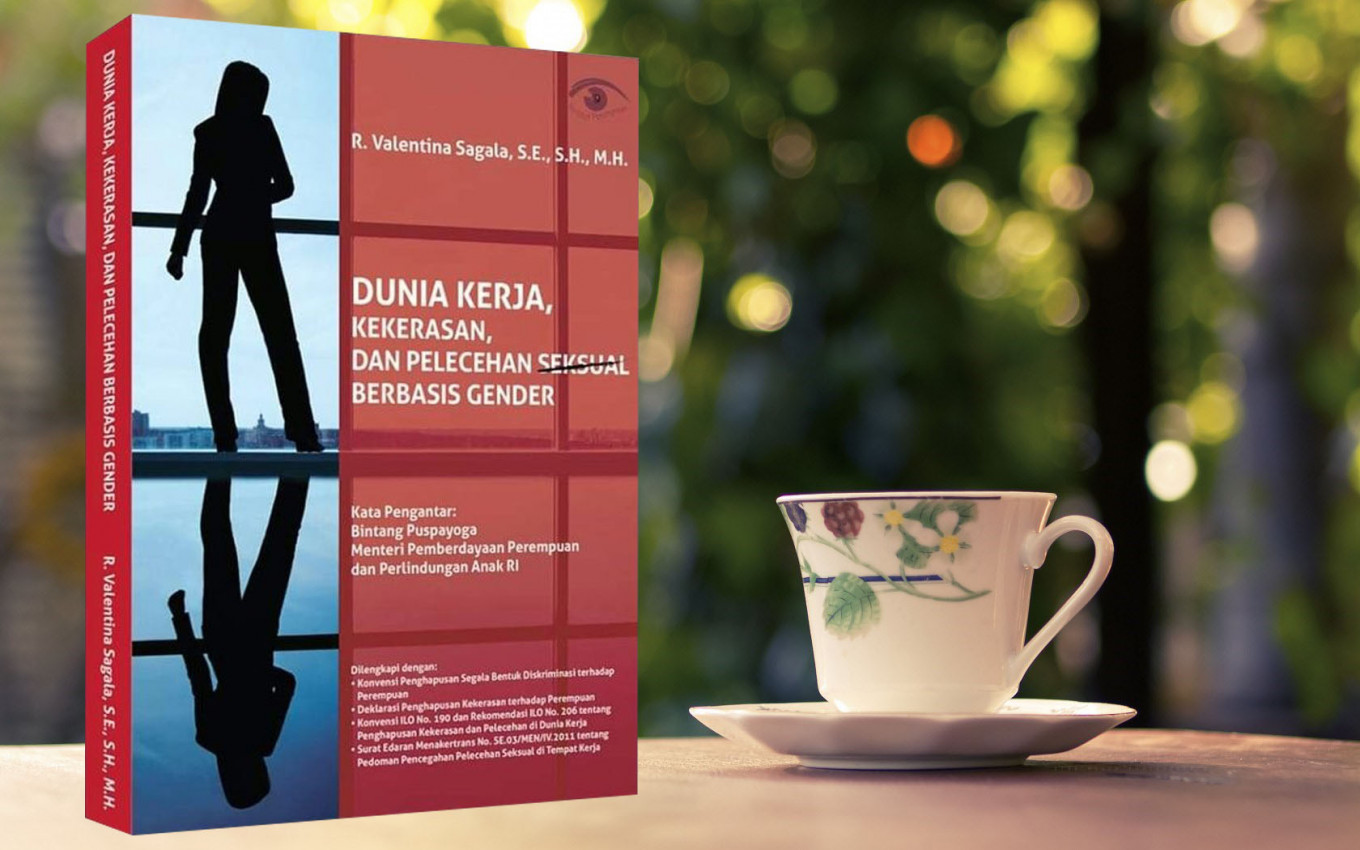Popular Reads
Top Results
Can't find what you're looking for?
View all search resultsPopular Reads
Top Results
Can't find what you're looking for?
View all search results‘Guidebook’ decodes ILO convention on gender-based violence
A new book takes an inclusive, educational approach to raise awareness and understanding – and hopefully, spur action – on the 2019 ILO convention that aims to eliminate violence and harassment in a broadened “world of work”.
Change text size
Gift Premium Articles
to Anyone
The world of work is not a safe space for women, as seen in the increasing coverage on gender-based violence.
The latest was a shocking exposé by the Associated Press (AP) published on Nov. 25, the International Day for the Elimination of Violence against Women.
The article unearthed multiple cases of rape and abuse against women at a Sumatran oil palm plantation associated with prominent beauty brands around the globe.
One victim AP interviewed was a 16-year-old who recalled that she was raped by her boss “amid the tall trees on an Indonesian palm oil plantation” where she was a shift worker.
Just two years ago in December 2017, the Inter-Factory Workers Federation (FBLP) released a documentary short film, Angka Jadi Suara (The Day the Voices Are Raised), on the violence and harassment female workers suffered at a factory in an industrial estate in Cakung, East Jakarta.
During their filmed interview, the female factory workers recount their experiences of being ogled and catcalled by male mechanics in the same factory. Some of the women still work at the factory, while the others have quit.
To better protect women and other marginalized groups in the world of work, the International Labour Organization (ILO) on June 21, 2019 introduced Violence and Harassment Convention No. 190 on the elimination of all forms of violence and harassment in the world of work, including gender-based violence, supplemented with Recommendation No. 206 on violence and harassment.
The new convention, which comes eight years after the United Nations in 2011 published its seminal Guiding Principles On Business and Human Rights, enters into force on June 25, 2021.
ILO Convention No. 190 can be considered a breakthrough in human rights protection in the world of work in two ways: First, it broadens the scope of “world of work”, covering a more diverse range of occupations; second, it broadens the definition of gender-based violence and harassment beyond sexual abuse.
The new convention provides guidance in an inclusive framework to multiple stakeholders on comprehensively protecting workers against violence and harassment, especially vulnerable workers from minority groups, women and other marginalized groups of people.
Sadly, according to women’s rights activist and founder of Institut Perempuan (Women’s Institute) Valentina Sagala, many stakeholders in Indonesia’s world of work are as yet unaware about the benefits of Convention No. 190.
This is what prompted her to write Dunia Kerja, Kekerasaan, dan Pelecehan Seksual Berbasis Gender (The World of Work, Violence and Sexual Gender-based Harassment) published this year by the Women’s Institute, to serve as a guidebook to help business stakeholders understand and apply the new convention.
“The ILO itself has urged member countries to ratify the convention. We definitely hope Indonesia will ratify the convention and adopt it in a national law. Unless we ratify the convention, the document will not be a legally binding one, only a morally binding one,” Valentina told The Jakarta Post in a Zoom interview.
Once Indonesia had ratified the convention and adopted it in law, the judiciary could then take legal action against those that violate its principles.
In ratifying the ILO convention, she continued, Indonesia could actually fill the legal gap left by its existing laws and regulations on workers’ protection, including the 2003 Labor Law. More specifically, the country’s judiciary could tackle gender-based violence and harassment, the 2011 Manpower Ministry decree on sexual harassment in the workplace.
Public institutions and private businesses that care about these issues need not to wait for the government to ratify the convention; they could freely adopt the mechanisms outlined in the convention to prevent violence and harassment in their organizations.
In her book, Valentina taps into her law background to explain the superiority of the new convention compared to existing legal instruments.
“The convention widens the scope of gender-based violence and harassment in the world of work beyond ‘just’ sexual ones. This is why I symbolically added a strikethrough to ‘sexual’ in the cover title,” she explained.
“The new convention also covers both the formal and nonformal sectors. When many people think about work, they think about the formal sector only, such as big businesses and corporations. Yet they forget that pekerja rumah tangga (domestic workers) are informal workers who they also need to protect,” she said.
Valentina said the majority of Indonesian women worked in the informal sector, whether as domestic, plantation, migrant or sex workers.
“The convention also covers workers’ protection issues in both urban and rural areas,” she said, pointing out that many people tended to have a strong urban bias when defining the world of work.
Convention No. 190 also uses the term “world of work” instead of “workplace” to indicate that workers can experience gender-based violence and harassment beyond their place of employment.
In this broader iteration, “world of work” covers all the places that workers visit or travel through in the course of their jobs, such as a client’s office or a business convention, and even public spaces for journalists and NGO field workers.
World of work also covers commuting on public transportation and the use of other public facilities for work-related purposes. Examples of gender-based violence and harassment while using public transportation services and facilities include verbal abuse and harassment from passengers, public servants and clients or colleagues.
More interestingly, the new ILO convention urges employers to allow workers who experience domestic violence to take some time off to recover from their physical and psychological trauma, and to reimburse the costs of any related treatment or therapy.
“I think it’s important for stakeholders of the various labor issues in Indonesia to have a grasp of how the new convention sets new protocols regarding violence and harassment in the world of work, especially in terms of gender,” said Valentina.
“All this time, people have tended to view gender-based violence and harassment more as a [moral issue], instead of setting clear organizational or institutional protocols on how to prevent them,” she continued.
“One corporate employer asked me, if he required all his female employees to wear modest clothing, would this prevent such violence from happening?” she recounted, highlighting that gender-based violence and harassment was a structural issue of unequal power relations between men and women.
Therefore, she said, the solutions to these issues also needed to be structural and address the power imbalance, instead of simply attempting a moral approach that generally tended to blame victims. (ste)












